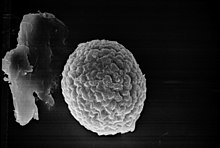| Karnal bunt | |
|---|---|

| |
| Scientific classification | |
| Domain: | Eukaryota |
| Kingdom: | Fungi |
| Division: | Basidiomycota |
| Class: | Exobasidiomycetes |
| Order: | Tilletiales |
| Family: | Tilletiaceae |
| Genus: | Tilletia |
| Species: | T. indica
|
| Binomial name | |
| Tilletia indica Mitra
| |
| Synonyms[1] | |
| |
Karnal bunt (also known as partial bunt) is a fungal disease of wheat, durum wheat, and triticale. The smut fungus Tilletia indica, a basidiomycete, invades the kernels and obtains nutrients from the endosperm, leaving behind waste products with a disagreeable odor that makes bunted kernels too unpalatable for use in flour or pasta. While Karnal bunt generally does not lead to devastating crop losses, it has the potential to dramatically decrease yield, and poses additional economic concerns through quarantines which limit the export of suspected infectious wheat products from certain areas, including the U.S. Several chemical control methods exist for Karnal bunt of wheat, but much work remains to be done in identifying resistant host varieties.
- ^ "Tilletia indica". Global Biodiversity Information Facility. Retrieved 12 February 2024.